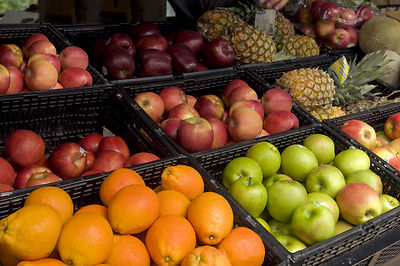
Tuesday, May 21, 2019 - About 70% of fresh produce sold in the U.S. has pesticide residues on it even after it is washed, according to a health advocacy group.
even after it is washed, according to a health advocacy group.
According to the Environmental Working Group’s annual analysis of U.S. Department of Agriculture data, strawberries, spinach and kale are among the most pesticide-heavy produce, while avocados, sweet corn and pineapples had the lowest level of residues.
More than 92% of kale tested contained two or more pesticide residues, according to the analysis, and a single sample of conventionally farmed kale could contain up to 18 different pesticides. Dacthal – the most common pesticide found, is banned in Europe and classified as a possible human carcinogen in the U.S.
“We definitely acknowledge and support that everybody should be eating healthy fruits and vegetables as part of their diet regardless of if they’re conventional or organic,” said Alexis Temkin, a toxicologist working with the EWG.
“But what we try to highlight with the Shopper’s Guide to Produce is building on a body of evidence that shows mixtures of pesticides can have adverse effects.”
Other foods on the group’s “dirty dozen” list include grapes, cherries, apples, tomatoes and potatoes. In contrast, its “clean 15” list includes avocados, onions and cauliflower.
What foods contain the most pesticides?
The most:
- Strawberries
- Spinach
- Kale
- Nectarines
- Apples
- Grapes
- Peaches
- Cherries
- Pears
- Tomatoes
- Celery
- Potatoes
The fewest:
- Avocados
- Sweet corn
- Pineapples
- Frozen sweet peas
- Onions
- Papayas
- Eggplants
- Asparagus
- Kiwis
- Cabbages
- Cauliflower
- Cantaloupes
- Broccoli
- Mushrooms
- Honeydew melons
One recent French study found that people eating organic foods were at a significantly lower risk of developing cancer, although it suggested that if those findings were confirmed, the underlying factors would require more research. Nutritional experts at Harvard University cautioned that that study did not analyze residue levels in participants’ bodies to confirm exposure levels.
While 90% of Americans have detectable pesticide levels in their urine and blood, “the health consequences of consuming pesticide residues from conventionally grown foods are unknown, as are the effects of choosing organic foods or conventionally grown foods known to have fewer pesticide residues.
“The health risks from pesticide exposure depend on the toxicity of the pesticides, the amount a person is exposed to, and the duration and the route of exposure,” the CDC says, noting evidence suggests children are at higher risk.
The Environmental Protection Agency sets rules for how pesticides are used, but those rules do not necessarily prevent cumulative exposure in a person’s diet.
Learn More at this Link